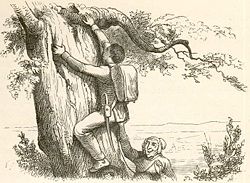The Tinderbox
"The Tinderbox" is a literary fairy tale by Hans Christian Andersen. It was originally published in Copenhagen, Denmark in May 1835 in the first booklet of Fairy Tales Told for Children. The three other stories in the booklet were "Big Claus and Little Claus", "The Princess and the Pea", and "Little Ida's Flowers". The critics did not like these stories. They thought the stories immoral. "The Tinderbox" is Andersen's retelling of "The Spirit in the Candle", a traditional Danish story he knew as a child. It is also similar to "Aladdin and the Magic Lamp", another Andersen childhood favorite. The tale has been adapted to various media including the first Danish animated movie.[1]
| "The Tinderbox" | |
|---|---|
 Illustration by Vilhelm Pedersen, Andersen's first and favorite illustrator | |
| Author | Hans Christian Andersen |
| Translator | Charles Boner |
| Country | Denmark |
| Language | Danish |
| Characters | Soldier Old Witch The Princess The Queen The King Three Dogs |
| Genre(s) | Literary fairy tale |
| Published in | Fairy Tales Told for Children (first booklet) |
| Publication type | Fairy tale collection |
| Publisher | C. A. Reitzel |
| Media type | |
| Publication date | May 1835 |
| Published in English | 1846 in A Danish Story-Book |
| Notable adaptations | First Danish animated movie |
| Followed by | Big Claus and Little Claus |
Story
A soldier steals a magic tinderbox from an old witch. The tinderbox can summon three magic dogs that will do what the soldier wants them to do. He orders one dog to bring him a sleeping princess from her parents' castle. When the king and queen learn where their daughter is, the soldier is arrested and sentenced to death. At the last moment, he summons the dogs. They save his life and he marries the princess.
Other websites
| Wikisource has original writing related to this article: |
| Wikimedia Commons has media related to Lua error in Module:Commons_link at line 62: attempt to index field 'wikibase' (a nil value).. |
- "Fyrtøiet" Archived 2005-12-18 at the Wayback Machine. Original Danish text
- "The Tinder Box". English translation by Jean Hersholt
Notes
- ↑ Opie, p. 206
References
- Opie, Iona and Peter. 1974. The Classic Fairy Tales. Oxford University Press.